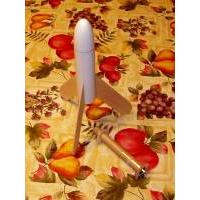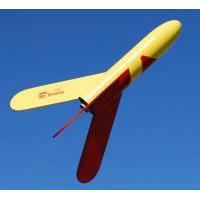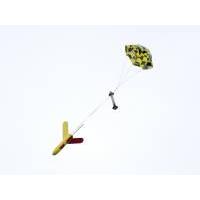| Construction Rating: | starstarstarstarstar_border |
| Flight Rating: | starstarstarstarstar |
| Overall Rating: | starstarstarstarstar |
 Brief
Brief
This is my Mo' Skeeter, a 320% upscale of the classic Estes Mosquito. It's a rear-ejection model, which avoids the visible nose cone line that most Mosquito upscales suffer from.
Components
This rocket consists of a Baby Bertha cone, 6" of BT-60, 6" of BT-20, two 20-60 centering rings, a thrust ring, engine hook, and retaining ring, a launch lug, and a shock cord consisting of a Kevlar leader and a length of elastic; I use a standard Estes or Semroc chute with it, attached via snap swivel.
The fins are 3/32" balsa, cut using a 320% upscale of the standard template downloaded from JimZ's site.
Construction
I cut the pointed part and attachment lug from the nose cone, bored a new hole to attach the Kevlar, and epoxied the cone in place on the BT-60 tube. I came to regret that decision a bit later.
After notching the centering rings (inside for the engine hook on the rear ring, outside for the shock cord for the forward ring), I installed the thrust ring, engine hook, and retaining ring into the BT-20. I still had some epoxy mixed up, so I used that to secure all these parts. After gluing the aft centering ring in place using yellow glue, I put the forward ring on the tube and inserted the assembly into the sustainer, pushing it in until the aft ring was just inside the BT-60 tube. Doing this pushed the upper ring into the exact position it needed to be in. I pulled the inner tube out and applied yellow glue to secure it.
Next, I glued the fins in place using yellow glue and the usual "stick it on, pull it off, let it dry a bit, glue it on for good" method. Here's where I regretted gluing the nose cone on first... I had to hold the rocket for probably twenty minutes before I was sure the glue was solid enough to stand the rocket on its fins.
When it was all dry, I applied several fillets of white glue (less shrinkage than yellow) then attached the launch lug with yellow glue.
Finishing
I brushed the fins with thinned Elmer's Carpenter's Wood Filler. I also brushed it over the body tube spirals and into the nose cone line. When dry, I sanded the filler smooth; then I started the usual prime-and-sand loop.
When I was happy with the surface preparation, I painted it yellow using a cheap store-brand rattlecan (I don't remember where I got it). Several light coats followed by the rotisserie treatment resulted in a deep shiny coat; I gave that the usual week to dry (as is usually required with the cheap paint), then masked it and applied Wal-Mart Colorplace Fire Red.
I created the decal myself using the GIMP and some clipart I found online, and printed it using a color laser printer. I didn't clearcoat the decal before applying it, and it suffered a little bit of flaking before I got clearcoat on the rocket, but it hardly shows. Laser printed decals sound like a good idea but the current laser decal paper has some deficiencies. Still, the rocket looks pretty good overall; I'm particularly pleased how well the red decal matches the Fire Red paint.
Flight

At our 4-H Club Launch on the 9th of July, 2009, I got to launch the Mo' Skeeter for the first time, on a B6-4. It flew well and recovered nicely, albeit on the roof of the landowner's machine shed. Thankfully, we were able to recover it in good shape.
I got to fly it again at the SPARC launch on August 22, 2009, on a B6-4 again. It was a perfect flight and a perfect deployment. It came off the rod too fast to photograph, which is surprising for a rocket with as much base drag as this one. There were some minor dings to the paint on the fins.
On September 18, 2010 we had a launch at the neighbor's. I flew it on a B4-4 for the first time, and WOW do I like that. It took off with more authority than I expected, and recovered beautifully.
Recovery

The nose-down recovery of this rocket tends to protect the fins from major damage. Though it rigs differently than other rockets, I have not suffered a deployment failure, nor any damage to the chute. And note, this rocket does not require wadding, since the upper ring shields the chute from exhaust gasses.
Summary
Mo' Skeeter has become my favorite flier. It's a real crowd pleaser.
#Related Reviews
- Clone Cloud Hopper By Steve Lindeman
Cloud Hopper was my second Goonybird clone that I built by kit bashing an Estes Baby Bertha and as a result has an 18mm motor mount instead of the 13mm that the original Cloud Hopper had. Components Components used for this build were one Estes Baby Berha Kit (1261) and the plans ...
- Clone Missile Toe By Steve Lindeman
Missile Toe was number three in my line of cloned Goonybirds that was built by kit bashing another Baby Bertha kit. As such the plans and decals were downloaded from Ye Old Rocket Plans (http://plans.rocketshoppe.com/estes/est0854/est0854.htm) and used for construction guide. ...
- Clone Sky Shriek By Steve Lindeman
The Sky Shriek was clone number four of the original Goonybirds that I built. And as such is another kit bashed Baby Bertha . The plans were downloaded from http://plans.rocketshoppe.com/estes/est0855/est0855.htm . I then followed these to build the Sky Shriek with the ...
- Clone X-15 By Steve Lindeman
In all fairness I can't do a brief description on this kit as there is a small story behind it. As is normal for me this is not an actual review of the Estes NASA X-15 (0889) [1988-1989]. It is a kit bashed, clone by transition. I came about the idea of doing the X-15 as the G-15 after ...
- Clone Zoom Broom By Steve Lindeman
Zoom Broom was the 1st of my Goonybird clones modified for 18mm motors as a result of being kit bashed from a Baby Bertha. Components Starting with a Baby Bertha kit (EST 1261) that I purchaced at my local Hobby Lobby, all components except the balsa wood and decals were used to ...
- Excelsior Rocketry Der Goony Max By Bill Eichelberger
Der Goony Max is an inspired bit of lunacy from Excelsior Rocketry, and I guess depending on where you stand on the Goony issue, this series is either genius or a waste of a good Baby Bertha. Speaking as the one-time-owner of an original Goonybird Cloudhopper, I happen to fall on the genius ...
- Kit Bash GoonyHawk By Steve Lindeman
Here I go again. For those of you that have followed my Goonyness this was Baby Bertha kit bash #14. Again this is not a kit review of the original Estes Hawkeye (Kit #0873) [1986-1996] It is another of my many kit bashes. All ...
- Kit Bash GoonAries SST By Steve Lindeman
Here I go again. For those of you that have followed my Goonyness this was Baby Bertha kit bash #10. Again this is not a kit review of the original Estes Aries SST (Kit #1927) [1983-1984]. It is another of my many kit bashes. ...
- Kit Bash Goony Target Drone By Steve Lindeman
Lucky or unlucky? For those of you that have followed my Goonyness this was Baby Bertha kit bash #13. As such I wanted to play it a little safer with this one so I choose a simpler design. Again this is not a kit review of the original Estes ...
- Kit Bash Goonymarc By Steve Lindeman
The Goonymarc was number eight in my line of modified Baby Bertha kit bashes. I started with the plans from Jim Z's for the Estes kit #654 with the thought of building the glider version of the Bomarc but ended up with the parachute version (kit #657). All templates and decals for this build ...
- Kit Bash NASA Goonasus By Steve Lindeman
One again this is not a kit review of the original NASA Pegasus (Estes Kit #1376) [1982-1986] but another of my many Baby Bertha kit bashes (#12 for those following my Goonyness). All fin patterns and decals came from http://plans.rocketshoppe.com/estes/est1376 ...
- Kit Bash Snarky Jr. By Steve Lindeman
The Snarky Jr. (a.k.a. Goony Shark) was kit bash #6 in what was to become a long list of Baby Bertha's that I converted into various Goony Birds and such. The inspiration for this one of course came from my DynaStar's - Snarky and the fact that I wanted to be able to fly it in the smaller ...
- Kit Bash Streamliner By Steve Lindeman
The Streamliner was the fifth in a series of Baby Bertha kit bashes that I did while building my Goonybird fleet. The first four kits were used to make four of the original Goonybirds from Estes but now it was time for somthing a little different. I remember seeing this model in a&n ...
- Kit Bash USGF Goonasus By Steve Lindeman
For those of you still following my Goonyness this was Baby Bertha kit bash #11. Again this is not a kit review of the original but another of my many kit bashes. All fin patterns and decals came from http://www.spacemodeling.org/JimZ/est0806.htm . The major ...
- Kit Bash USSF Goonyflash By Steve Lindeman
For those of you following my Goonyness this is Baby Bertha kit bash #9. So OK this is not a kit review so much as it's actually another of my kit bashes. All fin patterns and decals came from http://www.spacemodeling.org/JimZ/estes/est1909.pdf . The main ...
- Modification Baffled-Boat-Tailed-Bigger-Baby-Bertha By Mike Goss
It all started one day after I opened a Baby Bertha kit and found that the motor mount had the wrong size adaptor rings. The rings were for a BT-50 and not a BT-20. I thought about replacing the rings with a correct set, but then the creative juices started to flow, what could I do with this ...
- Modification BioHazard By Dwayne Shmel
This is a kit bash of a Baby Bertha that transforms a mild mannered rocket into mean, green, flying machine--the BioHazard. Modifications: One challenge was the tight fit of three 18mm motor mount tubes inside the BT-60 body tube. The 3 tubes were glued together and the inside "hole" was ...
- Modification Sky Goon By Stan McKiernan
This is a Goonie of one my favorite classic boost gliders, the Sky Dart. The Sky Goon starts as a Baby Bertha and adds wings, stabilizer and engine pod. Modifications: The rear of the nose cone is removed, leaving about 1/2" of shoulder which is glued to the body. The engine mount is built ...
- Scratch Streamliner By Mark Van Luvender
I chose to build the Streamliner for this contest as it truly spoke to me as something I could do--that doesn't happen often. This rocket started out as an Estes Baby Bertha kit. In order to create the "Streamliner", I cut a wedge shaped section out of the body tube starting just below where ...
Related Products
Sponsored Ads
 |
 |















